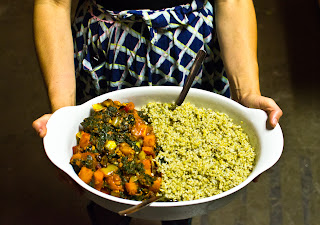It was exciting to design a meal for ADX’s fabrication festival. I wanted the dinner to feel interactive and so guests were invited to bring their own dining kit and table story; for the meal, diners “finished’ their dishes with the sauces that were served alongside the courses, the idea is that the dish didn’t come together until the diner added the sauces, in the amounts and combinations that suited them.
The inspiration for the menu was “communities of builders” and somehow these three sprang to the fore: bees (honey, hives, comb), Amish barn raisings, and Carthage.
Here is how I expressed these themes for the feast:
Bees: I bought a full bar of honey for diners to “harvest” honey from the comb. We served hexagonal pastry cookies (honeycomb is hexagonal) for diners to ice with a pea, feta, mint “icing.” The space at ADX buzzed with our conversation, like a hive, and Bill Taylor of PD(X) Lab brought a digital system that cast light patterns that shifted in accordance with the noise levels of our diners; we also called this a “digital barn raising.”
Amish Barn raisings: The whole notion of coming together for this fabrication feast felt like a barn raising. We invited numerous collaborators: Abraham King of Discourage records DJ’d, Tressa Yellig of Salt Fire & Time brought kombucha and kvass for cocktails, as well as a classic lemonade (think Harrison Ford in Witness, gulping down a glass of lemonade in one draught while Kelly McGillis watches and sweats), we convinced Cliff Allen of The People’s Pig to smoke and roast the lamb legs, and of course our hosts at ADX and our diners all made or brought things for the feast. So the Amish part of the feast was milk, honey, oats, jams, pork, all of the food that feels “heartland.” I kept thinking of the refrain, a land of milk and honey.
Carthage. Ok, Rome was a first reflex, but I thought Carthage, ancient Rome’s chief rival, would be more fun, especially as the founder of Carthage, Queen Dido/Elissa, was a Phoenician (Phoenicia is present-day Lebanon, Carthage is present-day Tunisia), so we could reference both Lebanon and Tunisia, so do more middle east, north African, southern Mediterranean foods. Dido was also a clever mathematician and there’s the whole Carthage foundation story of the oxhide and how after being promised land encompassed by an oxhide as a joke by the locals after she landed at Carthage, she cut the hide into tiny strips that encompassed a large territory. Perhaps apocryphal, but a great story, and there’s a math theorem named after this principle, called “Dido’s Theorem.” So the fresh figs and green pistachios belong to this flavor palette, as do the black olive oil, chickpea puree, the lamb rubbed with za’atar, and served with preserved citrus, harissa, yogurt, vegetable tagine and freekah (green wheat).
Honey in the comb
Fresh figs
Black olive oil with anchovy
Chickpea puree
Shredded pork maple, paprika
Hexagonal pastry cookie
Pea, feta, mint “icing”
Smoked corn, cherry tomatoes, alder-smoked salt (farewell to summer)
Roasted leg of lamb with za’atar
Vegetable tagine (looking to fall… root vegetables: beets, parsnips, potato and kale)
Freekah
Preserved citrus (grapefruit, lime, lemon, orange, honey and curry)
Harissa (Aleppo pepper for less heat than traditional harissa)
Yogurt, cucumber, mint
Oat shortcake
Raspberry and white peach jam
Chocolate and pear jam
Goat cheese, goat milk and cream
Young Pear
Green pistachios






